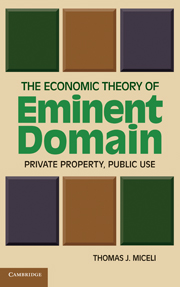2 - Public Use
Published online by Cambridge University Press: 05 June 2012
Summary
It's the great equalizer. We don't have large tracts of land. Urban centers are cut up into little parcels. Where do we acquire large parcels of land to attract large economic engines to enable us to compete with suburbia? We can only get it through eminent domain.
Tom Londregan, New London City attorney, cited in Benedict (2009, p. 250)The first requirement for use of the power of eminent domain is that the acquired land must be put to “public use.” Although seemingly straightforward, this issue continues to evoke debate regarding the proper interpretation of the phrase “public use.” In cases where the land is targeted for a truly public project like a highway, park, or airport – projects that meet the traditional economic definition of a public good – the use of eminent domain is not controversial. It is when the land is to be used as part of a largely private project, for example in the case of urban renewal, that it raises questions. Still, courts have generally allowed eminent domain to be used in such cases as long as the project in question promises substantial public benefits in the form of job creation, enhanced taxes, or the revitalization of an urban area. Some have argued, however, that this use of eminent domain – because it involves the transfer of land from one private party to another – renders the public use requirement essentially meaningless.
- Type
- Chapter
- Information
- The Economic Theory of Eminent DomainPrivate Property, Public Use, pp. 21 - 55Publisher: Cambridge University PressPrint publication year: 2011



